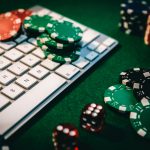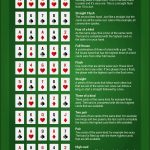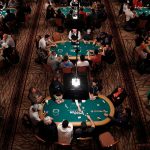Content Table:
Why is Poker Emotional?
Poker is a game played in an atmosphere of prestige and excitement, especially in the vibrant settings of casinos. However, for professional poker players, it is crucial not to be swayed by these external elements, as maintaining focus is essential. The poker table is a place where concentration is paramount, and any compromise can lead to failure.
The Human Factor in Poker
What makes poker one of the most interesting and intense casino games is the human factor. At its core, poker is a “people game,” and the emotional dynamics involved play a significant role in its complexity. The emotional aspect manifests prominently in the concept known as the “poker face.”
The Poker Face
The term “poker face” has transcended the game itself and is now used in various aspects of life. Originating at the poker table, it refers to the players’ efforts to conceal the strength of their hands. Emotions can inadvertently reveal the quality of a player’s hand through subtle physical reactions such as facial expressions, rapid hand movements, and perspiration. Being able to maintain a poker face is a critical skill that can influence the outcome of the game.
Reading Emotions
While concealing one’s emotions is vital, the second emotional capability in poker is emotional sensitivity. It is not enough to hide your feelings; you must also learn to read your opponents’ emotions. Understanding their reactions and body language can provide valuable insights into the strength of their hands and their overall state of mind during the game.
Relative Strengths
In poker, there is no absolute measure of a “strong” or “weak” hand; rather, it is all relative. The history of professional poker has shown that sometimes, players can win with what appears to be a weak hand if their opponents believe they hold a stronger hand. Thus, the game is often determined not by the actual strength of your cards, but by how your opponents perceive your hand.
The Emotional Demand of Poker
Becoming a good poker player is not solely about mastering the technical aspects of the game; it is also emotionally demanding. A player needs to possess a basic emotional intelligence that can either be innate or developed over time. Even if a player has this quality, it must be refined and expanded through practice. Improving your emotional skills in poker is a journey that requires dedication and ongoing effort.
The Path to Mastery
No one is born a great poker player; instead, it is a skill that can be cultivated with extensive practice. However, the question remains: how do you know when you’ve practiced enough? The answer is straightforward—one can never practice too much. Continuous engagement with the game, analyzing your plays, and learning from each experience will contribute to your growth as a player.
Conclusion
In conclusion, the emotional dimension of poker is what makes it a unique and thrilling game. The ability to maintain a poker face, read your opponents, and navigate the emotional landscape of the game can be the difference between winning and losing. Whether you are a seasoned player or just starting, understanding the emotional aspects of poker will enhance your gameplay and deepen your appreciation for this fascinating game.



